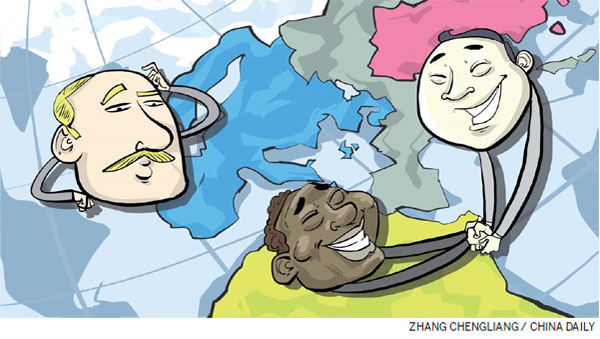EU needs fresh approach in Africa
Updated: 2014-05-09 08:07
By Anna Katharina Stahl (China Daily Europe)
|
|||||||||||

Sticking to old ways of doing things will not cut it in the new multipolar world order
The decision of Premier Li Keqiang to begin his African visit with a visit to the African Union headquarters in Addis Ababa symbolizes China's growing support for the continental organization.
The AU has recently become a member of the Forum on China-Africa Cooperation. Li and the chairperson of the African Union Commission, Nkosazna Dlamini-Zuma, expressed their wish to further strengthen collaboration between China and the AU. Most importantly, they announced the establishment of a new type of bilateral China-Africa strategic partnership.
The strengthening of Sino-African relations bears important consequences for the European Union, which considers itself Africa's traditional partner. In fact, the announcement of the China-Africa strategic partnership comes just weeks after an EU-Africa summit in Brussels. That was attended by the president of the AU, the chairperson of the African Union Commission, the presidents of the European Council and the European Commission, and several African and European heads of state and government. The summit declaration expressed the EU's intension to "give a new momentum" to its relationship with Africa and to build partnerships among equals.
Yet despite the positive assessment in the declaration of the current state of EU-Africa relations, a number of obstacles stand in the way of a genuine partnership between the two.

Most importantly, there is a lack of African ownership. This was reflected by the absence in Brussels of the South African President, Jacob Zuma, who boycotted the gathering in protest at what he considers patronizing EU behavior. He accused it of exerting pressure on the AU in choosing which African member states should attend.
In addition, African leaders denounced the EU's unilateral approach to a number of issues, namely economic partnership agreements and the trial of African leaders by the International Criminal Court. The AU has expressed concern that the EU is forcing African countries to conclude economic partnership agreements, despite worries that these could damage industry and agriculture in a number of African countries because they would expose them to competition from European imports. Moreover, current criminal proceedings in the International Criminal Court against the Kenyan leadership have stirred African sensitivities about sovereignty and self-determination. During an extraordinary AU summit, the organization called on its members to curb the court's jurisdiction.
Overall, tensions between the EU and Africa arise from the fact that the EU still clings to its traditional foreign policy, characterized by a predominantly unilateral approach. However, the international system is becoming multipolar, and EU policymakers need to realize that they must readjust their engagement with Africa in that light.
Li's visit to Africa and China's offer of an alternative kind of partnership with Africa is a good example of the changing geopolitical context. As a consequence of China's growing influence in Africa, the continent's leaders are now asking for a mutual partnership with the EU. It should start listening to African demands for more reciprocity and renounce its paternalistic approach under which African partners are expected to comply with pre-defined European norms and practices. In particular, European policymakers should put greater emphasis on fostering economic and strategic relations with Africa, the ultimate aim being a partnership of equals.
The EU should also stop treating African countries as mere recipients of aid rather than as economic partners. The EU-Africa summit declaration headed in the right direction, highlighting that the economies of the two continents are closely linked and that both should endeavor to ensure that the growth of one will help with the growth of the other. The establishment of the EU-Africa Business Forum, which takes place on the sidelines of each summit, has been an effective tool for advancing economic collaboration between the EU and Africa.
The EU also needs to put greater emphasis on Africa as a strategic player in world politics. Although the summit declaration did not use the term strategic partner when talking of Africa's relationship with the EU, it acknowledged attempts by the African Union Commission to speak with one voice to "enable Africa to become a key player in the global arena". The EU should further support the commission's participation in multilateral negotiations such as the post-2015 development agenda.
Apart from readjusting its bilateral relationship with Africa, the EU should also reach out to China. As Sino-Africa relations expand, European policymakers can no longer ignore China's presence in Africa. Instead of opposing China's influence in the region, the EU needs to enter into a dialogue with China on Africa.
The recent visit of President Xi Jinping to Brussels and the adoption of a joint EU-China statement calling for the deepening of the EU-China comprehensive strategic partnership is a good start in exploring synergies between the EU's and China's Africa policies. Through the adoption of the joint EU-China statement both sides agreed "to enhance their cooperation to the benefit of partners in the African continent". Moreover, they recognize that Africa's complex security challenges require common Sino-European responses. In that light, EU policymakers should develop innovative types of trilateral collaboration better suited to a changing world, as compared to traditional bilateral diplomacy. In that way Africa, China and Europe could together develop solutions for advancing sustainable economic development and peace in Africa.
The increasing strength of China-Africa relations is forcing the EU to reconsider its relations with the two, and to bring its foreign policy in line with the demands of the emerging multipolar world order. Growing EU engagement with Africa and China is indispensable, but it alone will not guarantee that the EU continues to play a significant international role. Only if the EU is willing to replace its traditional unilateral foreign policy by a reciprocal partnership with Africa and China will it be able to remain a relevant international player and shape the new world order.
The author is senior associate researcher at the Institute for European Studies and the Brussels Institute of Contemporary China Studies of Vrije Universiteit Brussel. The views do not necessarily reflect those of China Daily.
(China Daily European Weekly 05/09/2014 page11)
Today's Top News
Egypt angered about China's fake Sphinx
Poroshenko wins Ukraine election - exit poll
Euro elections reflect EU consensus
Pope calls for Israel-Palestine peace
Click profit online in China
Ukraine's presidential polls backfire
EU-wide elections could shake up the bloc
Beijing urges to intensify terror fight
Hot Topics
Lunar probe , China growth forecasts, Emission rules get tougher, China seen through 'colored lens', International board,
Editor's Picks

|

|

|

|

|

|





